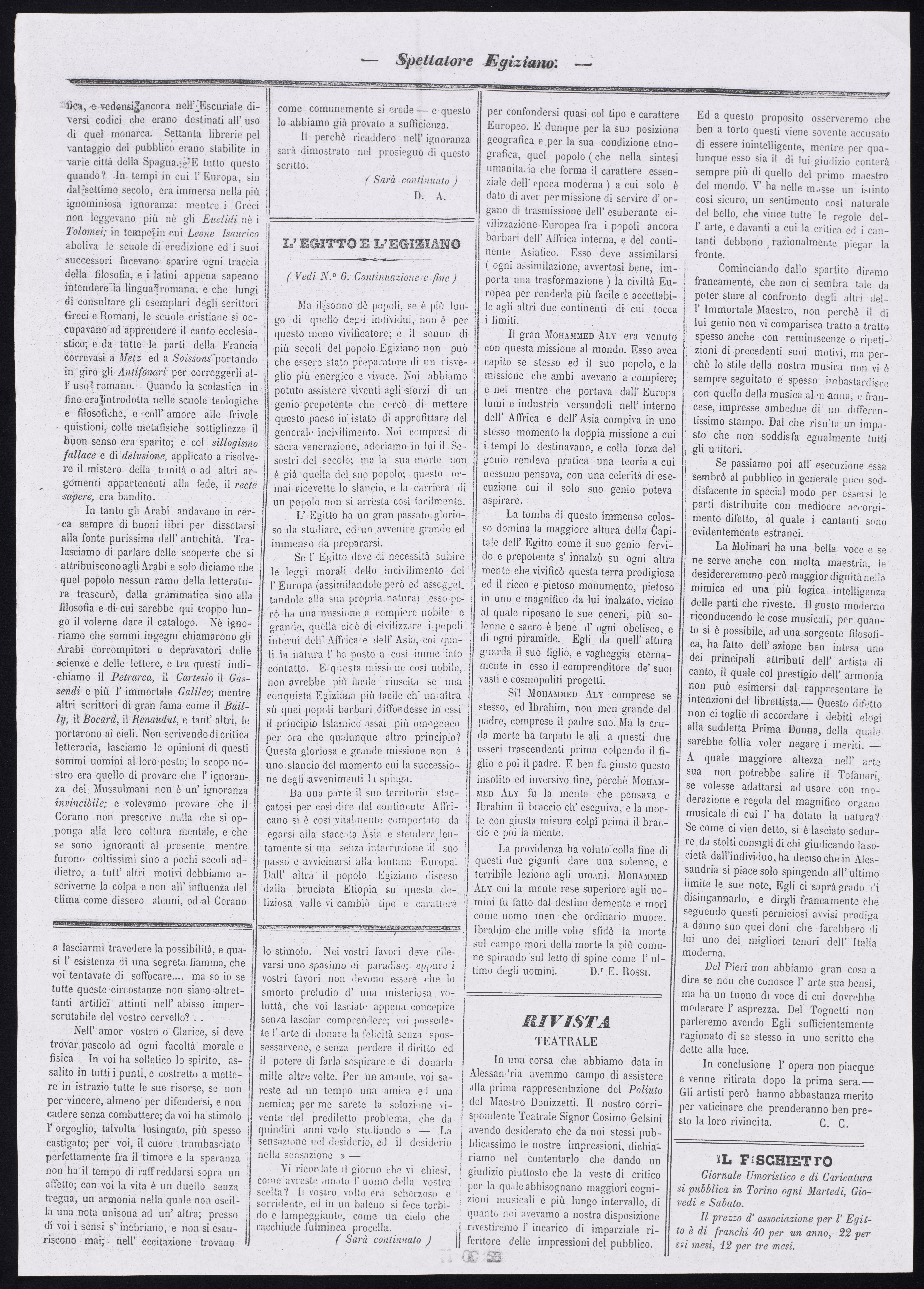19 October 1855: Sheet #4
Original title: spettatore-egiziano_0032.jpg

Transcription
Egypt and the Egyptian
But the dream of the people, if it is longer-lasting than that of individuals, is not less invigorating because of this; and for many centuries, the Egyptian population's dream has not been but preparation for a more energetic and lively reawakening. We have been able to help the living in the efforts of a powerful genius that looked to put this country in a position to take advantage of general incivility. We of sacred respect, worship in him the Senusret of the century; but his death is not really that of his people; this, by now, received outburst, and the progress of a population does not stop that easily. Egypt has a great past to study, and an immense future to be prepared for. If Egypt must endure the moral laws of civilization of Europe (assimilating and subjugating them to its own nature), it has, however, a noble and important mission to fulfill, that of civilizing the people within Africa and Asia, with who nature purposefully put in such close contact. And would this noble mission not be easily successful if an Egyptian conquest, easier on those barbaric people than by someone else, were to spread among them the much more uniform (for now) Islamic principle than any other principle? This glorious and great mission is not an impulse of the moment that is driven by the sequence of events. From one part, its territory, separated so to say from the African continent, is so vitally involved in tying itself to the disconnected Asia and in slowly extending itself, but without interrupting its passage and getting closer to the far-away Europe. From another part, the Egyptian population, descended from the burned Ethiopia to this wonderful valley, changed its nature and character to blend with the European nature and character. And so because of its geographic position, and because of its ethnographic condition, only that population (who in the synthesis of humans forms the essential character of the modern era) is given permission to serve as the agency of communication of the exuberant European civilization for the still barbaric populations of inner Africa and of the Asiatic continent. It must integrate (every assimilation, one must be aware, introduces a transformation) the European civilization to make it easier and more acceptable to the other two continents that it borders. The great Mohammed Aly came to the world with this mission. He had understood himself and his people, and the mission that both had to accomplish; and while he was bringing light and industry from Europe into Africa and Asia, he was at the same time fulfilling the double mission that time had destined him. With the strength of his genius, he put into practice a theory that no one had thought of, with a speed of execution that only a genius could strive for. This great legend's tomb dominates the major high ground of the Capital of Egypt, like his lively and powerful genius rose up above every other mind that revived this exceptional land. And the rich and compassionate monument, compassionate in one and magnificent in its construction of him, close to where his ashes lay, more solemn, sacred, and good than any obelisk, and any pyramid. From that height he watches his son, longs eternally for he who understands his vast and worldly projects. Yes! Mohammed Aly included himself, and Abraham, not less important than the father, including his own father. But brutal death clipped the wings of these two transcendent beings, first striking the son then the father. And this unusual and inversive ending was righteous because Mohammed Aly was the mind that thought and Abraham was the arm that executed, and a just death first strikes the arm then the mind. With the fall of these two legends, the Providence wanted to give humans a solemn and terrible lesson. Mohammed Aly, whose mind made him superior to men, was finished by a demented fate, and died in a way that less than ordinary men die. Abraham, who defied death a thousand times on the battlefield, died the most common of deaths, taking his last breath on a bed of thorns like the last of men. D.r. E. Rossi